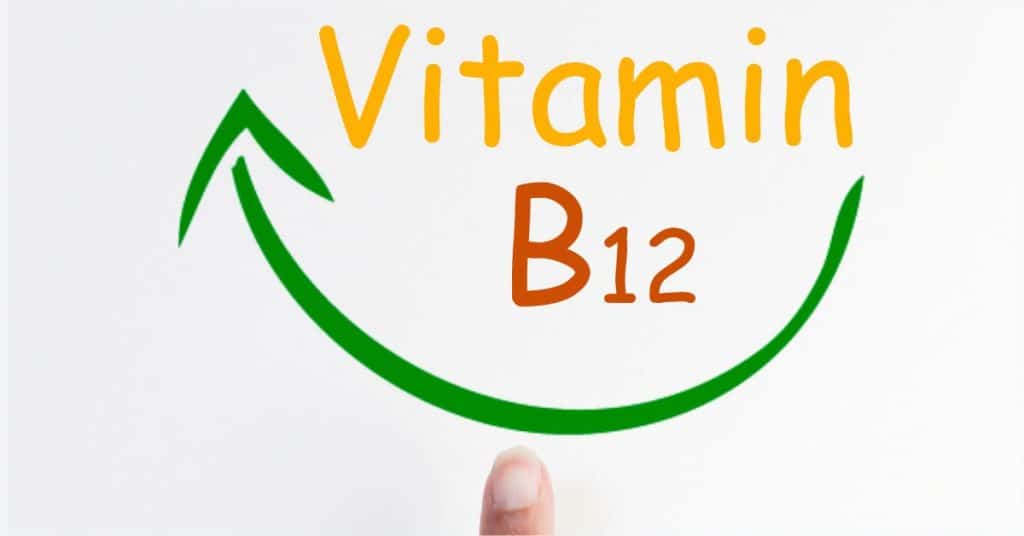Vitamin B12
Cobalamin, or more commonly known as vitamin B12, is one of the most important compounds in the human body. It is required for red blood cell formation and DNA creation and aids in the function of the nervous system. Health issues arise from not providing enough vitamin B12 to the body system which may lead to anaemia and other body enzyme functions. Vitamin B12 deficiency can often arise from not eating the recommended amounts of food items such as meats, fish, eggs and dairy. People that observe vegetarian and vegan diets may face the vitamin B12 deficiency. Because B12 is less available in the diet for the people observing strict vegetarian or vegan diets, supplements should be an option. People that are at a higher risk such as Vegans or vegetarians may need to ensure that they have regular blood tests or even check up’s to see their levels of vitamin B12.

Symptoms Of Vitamin B12 Deficiency
The deficiency of vitamin B12 can lead to a lot of symptoms and depending on the type of person maybe gradual. Most common ones are fatigue and increased weakness, pale or jaundiced skin, shortness of breath and dizziness. It can lead to numbness or tingling in fingers and a lot of balance problems because of the difficulty in walking. Cognitive disorders like losing memory or getting easily confused are also potential down sides of B12 deficiency. If not treated or taken care of, there can be a possibility that one can lose most of the symptoms if it becomes severe. Thus there has to be a level of B12 that needs to be taken into consideration.
Causes Of Vitamin B12 Deficiency
A lack of vitamin B12 can result from a number of causes, such as:
- Dietary Insufficiency: Low B12 levels can result from a diet deficient in sources from animals.
- Problems with Absorption: Disorders such as Crohn’s disease, celiac disease, or pernicious anemia can impair the body’s capacity to absorb vitamin B12.
- Drugs: Proton pump inhibitors and metformin are two examples of drugs that can affect the absorption of B12.
- Age: Because of increases in stomach acidity, older persons may be less able to absorb B12.
Risk Factors involved with Vitamin B12 Deficiency
Several groups of people are at a higher risk for vitamin B12 deficiency:
- Vegans and vegetarians: People who don’t eat animal products, which are the main source of B12, are at risk.
- Older Adults: B12 absorption may be impacted by aging.
- People with Gastrointestinal Disorders: Absorption of B12 may be hampered by conditions affecting the intestines.
- Women who are pregnant or nursing: If their increased nutritional needs are not adequately met, deficiencies may result.

Best Sources of Vitamin B12
In order to keep your vitamin B12 levels in control, think about including the following foods in your diet:
- Meat: poultry, liver, and beef are all great sources.
- Fish: B12 is abundant in salmon, trout, and tuna.
- Dairy Products: Cheese, yogurt, and milk are good sources of vitamin B12.
- Eggs: For people who eat animal products, eggs provide a flexible source of B12.
- Fortified Foods: B12 fortification makes certain plant-based milk substitutes and cereals safe for vegans and vegetarians.
Complications of Vitamin B12 Deficiency
The serious effects from vitamin B12 deficiency include the following if treatment is not received:
- Anaemia: Weakness and exhaustion may result from a shortage of red blood cells.
- Neurological Problems: Long-term deficiency can cause nerve damage, which can impair cognition, cause numbness, and cause balance issues.
- Heart Issues: Because severe deficiencies raise homocysteine levels, they may raise the risk of heart disease.
Prevention from Vitamin B12 Deficiency
A combination of dietary decisions and routine medical examinations can help prevent vitamin B12 insufficiency. Here are some pointers:
- Maintain a Balanced Diet: Make sure your meals contain a range of items high in B12.
- Examine Supplements: If you eat a vegetarian or vegan diet, discuss taking B12 supplements with your physician.
- Regular Check-Ups: If you are at risk, make an appointment for routine blood testing to check your B12 levels.
Case Studies on Vitamin B12 Deficiency
- Case Study 1: A 65-year-old woman presented with fatigue and memory issues. Blood tests revealed low B12 levels. After dietary adjustments and B12 injections, her energy levels improved significantly, and cognitive function returned to normal.
- Case Study 2: A 30-year-old vegan experienced numbness in her extremities. Upon consultation, she learned about the importance of B12 and began taking supplements. Her symptoms resolved within a few months.

FAQ’S on Vitamin B12
Q. What is the required daily intake of vitamin B12?
A: Adults should consume roughly 2.4 micrograms per day, though requirements may differ depending on factors including age, pregnancy, and medical conditions.
Q. Can a plant-based diet provide me with adequate B12?
A plant-based diet alone may not provide enough B12, so fortified foods or supplements are frequently required.
Q. What adverse effects might B12 supplements cause?
A: Although B12 pills are usually safe, some people may have minor adverse effects including itching or diarrhea.
Conclusion
An essential of the health is vitamin B12 as it supports the red blood cells, the nerve function, and also DNA synthesis. This deficiency of vitamin B12 should be treated early either by diet, supplementation, or a medical provider as it can lead to complications. Screening is regular if you are at risk of deficiency due to your diet, age, or medical conditions. Be proactive and consult your doctor for any symptoms that you may notice. Prioritize B12 because it carries long-term health and energy benefits.